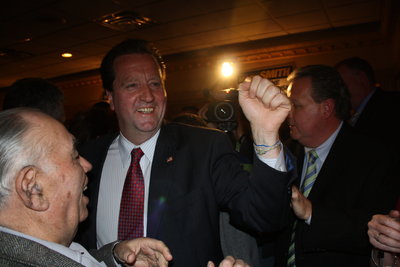If winning an election is about how organized your campaign is, then Mark Smith’s overwhelming Bayonne election victory on May 11 was no surprise.
The incumbent mayor carried his ticket to a nearly complete victory, winning his seat by a three to one margin over Assemblyman Anthony Chiappone and retired police officer Leonard Kantor, while carrying his two at-large candidates Terrence Ruane and Debra Czerwienski to victory, as well as his 2nd Ward candidate, Joe Hurley.
In the 1st and 3rd wards, June runoff elections will be held between Thomas J. Cotter and Agnes Gillespie in the 1st and Ray Greaves and Gary LaPelusa in the 3rd.
Smith won with 7,402 votes or more than 66 percent of the vote over Chiappone, who had 2,503, and Kantor with 1,239.
“All along his message wasn’t about himself.” – Paul Swibinski
________
Gillespie led voting in the 1st Ward with 1,598 votes, or just over 44 percent. Cotter came in second with 1,365, followed by John R. Cupo with 325 and Raphael J. Massarelli with 324.
Hurley avoided a runoff in the 2nd Ward by collecting almost 52 percent of the vote with 1,515, followed by Ramon Veloz with 624, Salvatore Gullace with 510, and Jack Butchko with 290. Although Greaves lead voting in the 3rd ward with 1,523, this was about 48 percent, shy of the 50 percent he needed to avoid a runoff. La Pelusa collected 1,324 votes, and Debra Noble, 328.
Contrast in campaign HQ’s
For hours prior to the closing of the polls, Smith’s headquarters buzzed with activity and optimism as hundreds of workers came and went or talked on phones, seeking to squeeze out every vote before the polls closed at 8 p.m. Workers spilled out onto the sidewalk near 27th and Broadway for private conclaves or hurried conversations on cell phones with campaign workers. They rushed to beat deadlines, searched out voters house by house, street by street, ward by ward.
By contrast, the campaign headquarters of Anthony Chiappone three blocks down on Broadway seemed sparsely populated, sending a small group of workers out into the field so that at times, Chiappone stood alone in the large storefront, a small table outside with a handful of colored balloons.
While Smith looked exuberant, rushing into his headquarters briefly, his white shirt wet with perspiration, Chiappone waited and watched as people passed by his table or workers returned with reports from this group of poll workers or that.
Leonard Kantor, the third mayoral candidate, seemed to make the streets of the city his campaign headquarters, heading from polling place to polling place, street to street, in the single-minded pursuit of making himself visible to the voters.
Smith’s message
Smith avoided a runoff election by getting more than 50 percent of the vote.
“All along his message wasn’t about himself,” said Paul Swibinski, campaign consultant, who handled many of the mailers and other advertising spots. “His campaign was about getting his team elected.”
But unlike in the past, Smith supporters did not share their anxiousness over the pending results, choosing to keep their door closed to the press and the public while they calculated their numbers, later making a public ceremony at the Chandelier ballroom after the tears and fear subsided.
Chiaponne’s campaign largely conceded defeat early as the numbers from the first five districts came in.
“It’s over; we’ve lost,” one of the dejected workers said.
While Smith beat his opponents handily to get his first full four-year term, he could not quite generate the 50 percent plus one vote necessary for his 1st and 3rd ward candidates, although they appeared to come close.
Smith has served as mayor for the past 16 months after winning a special election in November of 2008, saying that he has lived up to the campaign promises he made to downsize government and make it more efficient.
Chiappone faced a serious obstacle because he is currently under indictment for allegedly mishandling Assembly aide checks in 2005. Maintaining his innocence despite last fall’s indictment, Chiappone ran against Smith because he said he felt Kantor did not present voters with enough of a choice.
Kantor, a self-declared fiscal watchdog, claimed before polls closed that this would be his last election.
